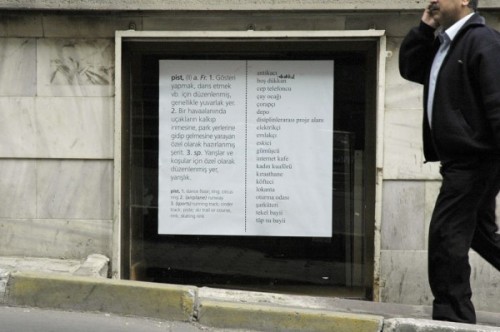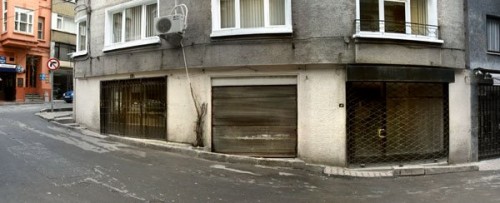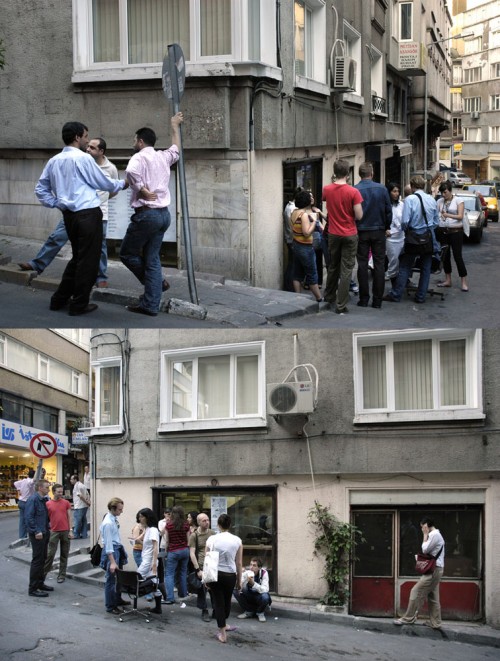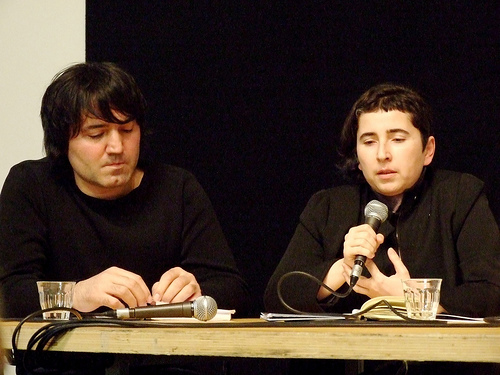PiST///Interdisciplinary Art Space is storefront gallery space and artist project co-directed by artists Didem Özbek and Osman Bozkurt. Opened in 2006, PiST/// is located in Istanbul’s Pangaltı neighborhood, a frenetic, working class area located adjacent to posh Nişantaşı and one metro stop from crowded, chaotic Taksim Square. Despite its proximity to these areas, Pangalti feels like a different world, and even Istanbullus who live nearby confess to to rarely heading into that part of town. “It’s so far away!” an acquaintance who lives in Tophane exclaimed when I mentioned my planned visit to interview Özbek and Bozkurt. When I reminded him of just how close it was, he seems surprised. “I guess you’re right,” he responded thoughtfully. “But it seems very far.”
In many ways, PiST/// does feel miles away from Tophane’s plucky commercial spaces and Istiklal’s larger galleries, standing shoulder to shoulder with newer institutions such as Arter and the just-opened SALT. Its isolation within the institutional geography of the city is indicative of Özbek’s and Bozkurt’s dedication to critiquing the status quo of the professional art community. However, PiST/// is more than a “cube,” more than four walls and a roof which enclose objects or events. It’s a set of practices, an experiment in relationships, collaboration, business models, and professional endeavors. “PiST/// is not an exhibition space” they explain, but rather a medium of “experience exchange,” a means by which individuals with the same interests and concerns, engaged in the same kind of work, can share knowledge, resources, and experiences so that no one has to reinvent the wheel and when the tide rises in one place, boats all over the world rise together. Yes, things happen in PiST///–lectures, screenings, discussions, and, indeed, exhibitions–but these activities are only a portion of what “PiST///” truly means for its directors.
PiST///’s current project, How To Turn the World By Hand, embodies this ethos of creating meaning by doing. For the entirety of 2011, Bozkurt and Özbek are devoting PiST///’s energy and resources to a collaboration with two other artist-run, storefront spaces, Beijing’s Arrow Factory and Edinburgh’s Collective Gallery. The individuals in charge of these three spaces all met in May 2010 while participating in the Tate Modern’s No Soul for Sale–A Festival of Independents event, during which the museum invited seventy independent artist collectives, spaces, and organizations to take over Turbine Hall and curate a weekend of projects, performances, and events. Over the course of this year, the organizers of each space will convene in each of the three cities to present their work and engage in dialogue about their experiences, with a specific focus on investigating context-specific programming.
The first of the three convergences occurred in Istanbul during January and February. I attended the presentation by Arrow Factory’s directors, Rania Yo, Wang Wei, and Pauline Yao, in early February. Over the course of the three presentations, Yo and Wei showed slides of recent works and Yao, who is actually a curator, talked about issues of labor and the role of the “artist” in the production of contemporary art in China. In addition to their presentations, the Arrow Factory gang also set up a “mobile bazaar” in which they sold a wide variety of items they brought with them from China (for what I thought to be very reasonable prices): beautiful vintage elementary school posters, textile scissors, a mobile phone, small green bottles of a mysterious vodka-like liquor, calendars, compasses, and fake Muji pens were just a few of the objects available. During a break between presentations and after they were finished, the mobile bazaar was open for business, and I’m fairly certain almost everyone in attendance left with at least one item.
While this may strike some as crass commercialism or taking advantage of the “exotic” qualities of objects from a foreign culture, the bazaar actually fits perfectly with Özbek’s and Bozkurt’s very practical approach to their work. The reality is that, while Özbek and Bozkurt have done a lot with PiST/// with almost no financial support or backing (including, as Özbek points out, many “zero budget” projects), their work would be much easier, and they could do even more, if they did have some reliable source of funding. The “zero budget” project model is not a chosen business model, but the reality of the conditions in which they have been forced to work; in Turkey, the government is at best indifferent and at worst openly hostile towards the work of contemporary artists. Funds come primarily from the banking sector, which has been the driving financial force behind the explosion of art institutions in Istanbul over the past five to ten years.
While there’s no way the Arrow Factory crew made enough on their mobile bazaar sales to finance their whole trip to Istanbul, it certainly went some distance in helping them cover their costs. It made the project a little more sustainable. And that’s what PiST/// and the idea of “experience exchange” is all about–not just providing a space for institutional critique, but finding ways to make that work sustainable in the long run. Özbek and Bozkurt have no romantic notions about the thinness of their resources–talking with them about their five years of work on PiST///, they show justifiable pride in their accomplishments, but also exude a sense of exhaustion, that bone-tiredness that only comes when you’ve sunk everything you have, materially and spiritually, into your work. You shouldn’t have to turn the world by hand, but if you do, having others to share the task certainly makes it a lot easier.







